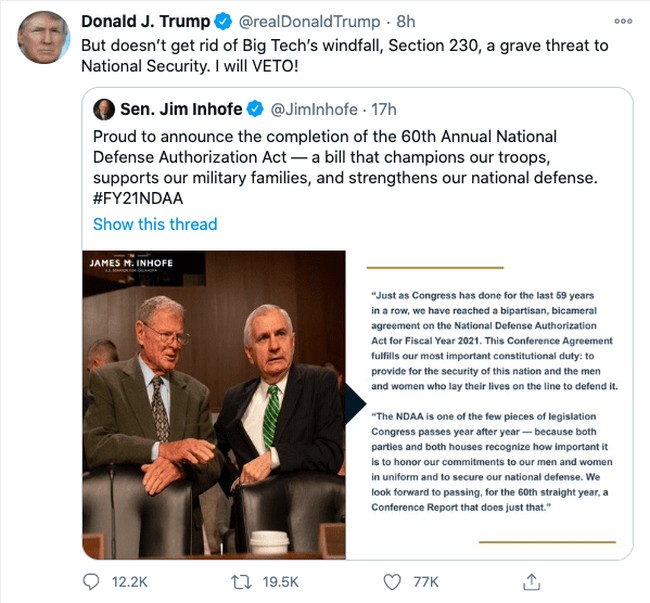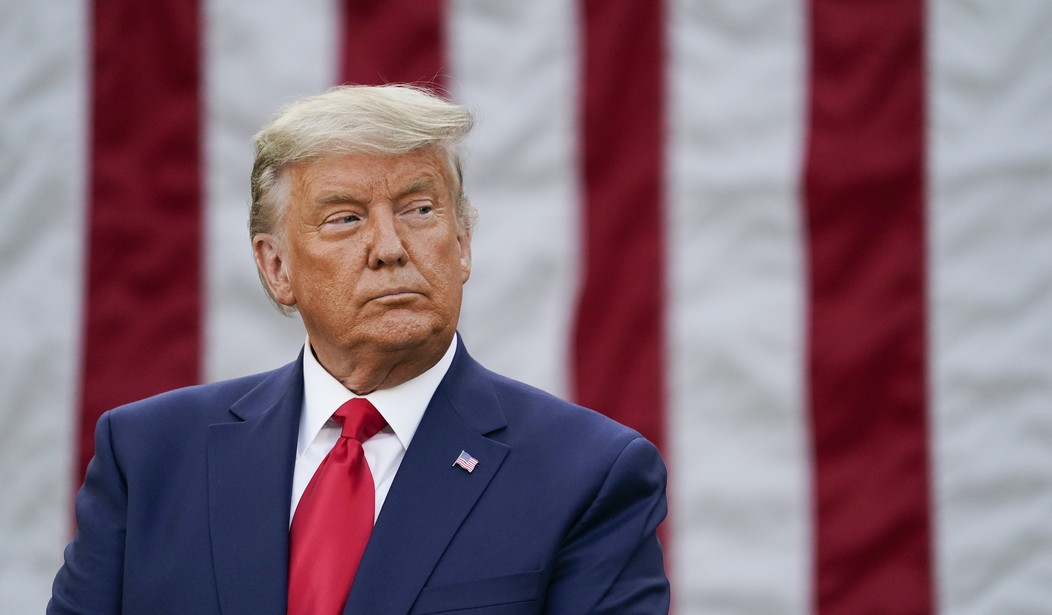On Thursday night, President Donald Trump repeated his pledge to veto the National Defense Authorization Act (NDAA), a crucial military spending bill, if it did not include a measure to terminate Section 230 of the Communications Decency Act, which many on both the Right and the Left consider a blank check for Big Tech companies. Yet many have warned that abolishing Section 230 would cause more problems than it might solve.
Trump called out the NDAA’s sponsor, Sen. Jim Inhofe (R-Okla.), after Inhofe insisted that the termination of Section 230 did not belong in a military spending bill and after the Senate amended the legislation to include a measure renaming military bases and other military assets that bear a Confederate name.
“Very sadly for our Nation, it looks like Senator [Jim Inhofe] will not be putting the Section 230 termination clause into the Defense Bill. So bad for our National Security and Election Integrity. Last chance to ever get it done. I will VETO!” the president tweeted Thursday night.
Inhofe announced the NDAA’s completion on Thursday. Trump responded to his announcement with this brief message: “But doesn’t get rid of Big Tech’s windfall, Section 230, a grave threat to National Security. I will VETO!”

“Section 230 has nothing to do with the military,” Inhofe told reporters at the Capitol, Newsweek reported. “I agree with his sentiment, we ought to do away with Section 230. But you can’t do it in this bill. That’s not a pertinent bill.”

 Editor’s Note: It’s time for conservatives to stand together and fight big-tech censorship. Join PJ Media VIP and use the promo code CENSORSHIP for 25% off your VIP membership.
Editor’s Note: It’s time for conservatives to stand together and fight big-tech censorship. Join PJ Media VIP and use the promo code CENSORSHIP for 25% off your VIP membership. 

Section 230 shields internet companies from some forms of liability for content third parties publish on their platforms, with some allowance for basic content moderation. Many conservatives have argued that companies like Facebook and Twitter routinely abuse this rule, targeting conservative viewpoints for censorship in a way that makes these platforms “publishers,” which would subject them to liability. Conversely, many liberals warn that companies do not go far enough to police allegedly dangerous speech on their platforms.
Some conservative free-market groups have vehemently opposed the elimination of Section 230, however. On Wednesday, the Competitive Enterprise Institute (CEI) sent a letter to Congress warning against changes to Section 230 in the NDAA.
“Section 230 has been called the law that created Internet as we know it. It accomplished this through a simple premise: You are responsible for what you say or do online and the platform that hosts your content is not. This shield against intermediary liability has allowed countless online services, from the biggest names in Silicon Valley to the website currently being invented in an entrepreneur’s garage, to grow and operate on a global scale,” the CEI letter argues.
The letter warns that if Congress repeals Section 230, it would harm emerging tech companies that aim to compete with established firms like Facebook, Twitter, Google, and Amazon. “If Section 230 were to be repealed, or even watered down, this next generation of platforms will likely be thwarted by liability threats. ‘Big tech’ firms have the resources to comply with new mandates and regulations, so erecting this barrier to entry to nascent firms will artificially lock currently dominant firms in their lead positions.”
Perversely, the regulation Trump wants in order to rein in Facebook and Twitter might actually protect these companies from potential competition by preventing newer start-ups like Parler from getting off the ground. Many organizations joined CEI in issuing this warning, including the National Taxpayers Union, the Libertas Institute, Americans for Prosperity, the Taxpayers Protection Alliance, FreedomWorks, and the R Street Institute.
In October, the Federal Communications Commission (FCC) announced it would draft a new rule clarifying Section 230 — a better path forward than abolishing the measure. Either Congress or the administration should clarify Section 230’s limited liability protections, rather than striking the law altogether.
Yet the current version of the NDAA — a compromise between House and Senate versions — also includes a provision to strike Confederate names from U.S. military installations, an amendment Sen. Elizabeth Warren (D-Mass.) spearheaded.
Trump has vehemently opposed such measures, warning that attacks on Confederate monuments represent a slippery slope toward removing statues of George Washington — an argument very much vindicated this summer when Black Lives Matter and antifa agitators moved from targeting Confederate statues to knocking over statues of Washington, Thomas Jefferson, and even black Union soldiers who fought against the Confederacy.
“A provision is in the NDAA for the renaming, or even desecration, of National Monuments in National Parks. This is not what our Country wants!” the president tweeted Friday morning.
Trump has long championed a strong military as key to peace and advancing America’s interests. It is tragic to see these political squabbles over a bill he generally supports in what may be the twilight of his term.
Tyler O’Neil is the author of Making Hate Pay: The Corruption of the Southern Poverty Law Center. Follow him on Twitter at @Tyler2ONeil.









Join the conversation as a VIP Member